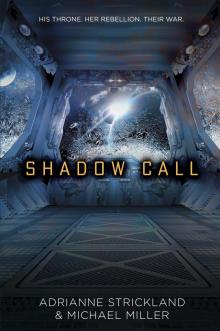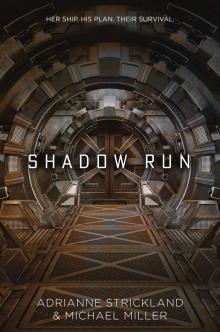- Home
- Michael Miller
The Alien Creator Page 5
The Alien Creator Read online
Page 5
"Depending on thermodynamic properties and if we put dash cams at various places on the rods, we should see the ship," Billy nod. "I believe the cloaking technology only works to counter income radio signals. Being literally invisible is pure science fiction."
Bobby puts dampers on emerging euphoria. "But if heat is the main issue, then you're saying we'll have to let them waltz into the mesosphere or even closer if the thermosphere is more than two-thousand degrees?"
"Higher," Myers nods, "it's almost three-thousand degrees Fahrenheit."
"That's why our first chance to track them continually may not come until they're below fifty miles in the mesosphere," Billy elaborates.
"How high does the Space Station operate?" Bobby says.
"Two-hundred fifty-four miles in the thermosphere," Myers rattles off.
"That's too far away," Billy cautions. "I'm thinking stratosphere if we want to use satellites and balloons as additional points of reference to encircle them."
"Should we ask for cooperation from the Commies?" Bobby guffaws. "I wonder if they're aware we have visitors. That'll be great being a bug on the wall during that call."
Billy ponders the question. "The President will probably want your opinion, boss, about sharing this information with Russia and China. I think we can pull it off without them, but we'll need quite a few balloons to ensure success."
"How many balloons are you thinking we'll need?" Bobby's lips squeeze.
"Hard to say; twelve or more with the right elevations should be enough."
"Wow, that's gonna draw media attention like a three-ring circus, Billy, especially if a couple balloons interfere with satellites. Jamming will cause attention."
"Maybe; but we won't be engaging them in deep space. Remember, we'll need to be under the Karman line."
"Why do you think waiting is our best chance?" Myers presses the teen, far wiser than his age suggests.
"Quite frankly, I'm less certain that re-tasking satellites is gonna work, boss. Hitting maneuverable space vehicles, in this case alien vessel, isn't comparable to hitting lumbering missiles. Also, the element of surprise will be lost. I believe our best chance will be the rods-from-God. ICBMs fly at much higher ceilings, maybe three-thousand miles. Besides, we can't overcome the heat element, much less the elevation using neoprene and polyethylene balloons. They'll have to be close in order to find them."
"Why didn't you speak up during the White House call?" Myers snipes. "This is a highly relevant discussion we're having."
"Are you kidding with Bull Greer growling and rolling that stogie in his mouth? Besides, with all the military brass and White House big wigs on the call, here's this skinny kid wearing high top Converse sneakers telling them they're wasting time; I don't think so," he pauses as others consider Billy's humility. "Besides, it takes time thinking through this stuff. I'm not a genius."
"You could have fooled me," Bobby chuckles. "Hang on, it looks like they found Amos-12," he interrupts checking a text message. "Freddy wants us in the control center. Their cloaking device is shutting down again."
"All right," Myers tells staff. "Let's watch how they handle the little Israeli bugger. Maybe, we can learn something useful to pass on."
Global Space Control Center
Watching several desk and overhead monitors zeroed on the spaceship and Israeli nanosatellite half a billion miles away, it's unclear if Zote intends capturing or destroying the eight kilogram object about the size of a shoebox. As the enormous multi-ton spacecraft edges closer, Amos-12 begins gyrating and darting as if teasing the aliens. Time after time, the same process unfolds as the alien ship adjusts to get closer. After a long period of trial and error, the alien halts activity.
"It looks like an enormous cat chasing a terrified mouse," Myers smiles, "and the mouse is winning. I wonder if ISA (Israeli Space Agency) is watching this David and Goliath spectacle? If so they must be proud of their invention."
"I doubt they're able to watch," Bobby answers, "but I'm sure they're getting alert signals from Amos-12. It's amazing how it dodges and darts like Muhammad Ali's rope-a-dope. What an amazing invention."
"How far and fast is Amos moving when it jerks away?" Myers asks the telemetry team. "I can't begin to imagine how it works, though antennas must be very sensitive to movement and motherboard must have superfast chips."
"That's an Intel tenth generation chip made in Haifa for the Israeli military," Billy explains. "I read about the guarded plant in a science journal last month. Chips sell for more than fifty thousand bucks."
"Amos-12 burst of power is lightning quick; I'd guess several thousands of miles per hour," Bobby replies calculating time and distance between points. "It's gotta be frustrating for Zote."
"It doesn't look like Zote is going to get close enough to grab it," Billy adds to the conversation. "Each time he gets within a hundred miles, Amos zips and zags like a scared butterfly avoiding nets."
Suddenly, Amos-12 euphoria stops cold when it disappears from monitors like the first orb. "What happened?" Myers blares. "Where's the little bugger?"
"It appears Zote lost patience," Billy sighs, "and the ship's signal is gone again. I think he blew a fuse and blasted it into oblivion. Only this time, I suspect Zote was angry and gave it both barrels."
"All right; an angry alien robot is all we need. I best pass this information to the White House. Besides, Israel is likely to call soon asking for help finding their toy."
"Wilford won't tell them," Billy guesses. "Zote is our problem, I'm afraid. Somehow, he figured out we're king of the hill on this planet and getting others involved is a waste of time."
"I'll see you fellows later; wish me luck," Myers shakes his head wondering how he'll handle expected questions.
Chapter Four
Alien Spaceship
he alien science team, a small fleet of mechanical box-shape robots on flexible track pads, each with various capabilities and skill sets, inform Zote his information is ready for use. Plugging an extended sharp instrument into a busy control panel inside the command center, Zote waits as the wide array of information about atmosphere, solar activity, temperature, space objects, threat assessments, distances, sizes, and other relevant data load into internal memory registers. Based on this information, the cautious robot will decide if the time has arrived to awaken a supreme hybrid, thereby ending his leadership. Despite decades since lifting off home planet U-tom, no sense of nostalgia or loneliness affects its internal processors. When the time is right, he'll be mothballed or discarded like outdated CPU.
Arranging equivalent petabytes of data into analysis of planet water supplies, average temperatures, and atmospheric quality, he methodically arrives at reasoned conclusions that closer inspection of the surface is necessary before one of two supreme hybrids is unfrozen. Instructing more sophisticated helm navigation minions to guide the ship closer for topographic scans and detailed surveys including fresh water availability, mineral deposits, and land mass analysis, Zote decides to contact Earth's leader a second time.
Moving to the science laboratory two levels below where the captured Global Space orb is being analyzed, Zote and the mechanical interpreter stand in front of the orb's nose camera to address the Arizona butte team.
"I will update President Wilford," Zote announces to gawking engineers inside the Arizona butte.
"All right; I'll patch him through shortly," Bobby Rafferty replies once signaling security personnel to fetch Billy and John then get the White House on the line. "Please stand by, Zote."
As seconds pass, Bobby gathers courage. "My name is Bobby Rafferty, senior telemetry specialist and mechanical engineer," he tells the fierce robot that has a powerful voice. "I also have family and girlfriend I care about very much. Do you have family on U-tom, Zote? Are there machines and organisms you care about?"
Once understanding what Bobby means by family and girlfriend, Zote responds. "I care about Creators, if that is what you ask. Every machine and hybrid must
protect them. Family is not a concept Creator's adopt for machines. Do you ask this question due to mental frailness and short lived body composition?"
"My body is composed of skin, bones, and blood like every human on this planet, Zote. I'm talking about feelings inside the heart and brain. Do you hold memories and love for other machines, hybrids, and organisms like we do for other humans and animals?"
"Love, biases, and feelings are not programmed in data registers, although we learn from our enemies. Life is providing service to Creators. Without them, I do not exist. The closest equivalent for humans is God."
Though Myers entered the control room a few moments earlier, he's intrigued listening to Bobby and Zote share ideas, especially about deities. Perhaps, he's on to something that could make these aliens more vulnerable or reasonable.
"I'm here, Zote; the President will be on with us shortly," Myers tells the alien standing next to seated Bobby. "The President's office is several thousand miles away, so the time lag is a few minutes."
"I'm on the call, Zote," President Wilford says as he joins. "I was told you have new messages."
Zote listens while fed interpretation from a linguistic minion strikes his brain. "We finished preliminary analysis and decided this planet requires closer inspection. Consequently, I will instruct flight minions to bring this vessel into what you call the mesosphere. Any effort to attack or hinder our progress will lead to severe penalties. Do you understand penalties?"
"I understand penalties, Zote. You must also understand that we are not about to hand this planet over to anyone. It's our home and we will defend it."
"Closer inspection of this planet is not threatening to humans, at this point," Zote explains. "If you provoke me, the only choice I have is an overwhelming response. I will announce if your planet is our new home for Creators. At that point, I will unfreeze one hybrid. Then you must deal with it."
"Why control the planet, Zote? Can we share the planet? We can make space and help create an environment where Creators thrive. Our medical staff and equipment is the best in this galaxy. Do you understand?"
"Your history does not favor sharing peacefully, President Wilford. Human nature is unlike machines. Besides, supreme hybrids do not share. They take space for Creators and create harmony once threats are gone. It is necessary from their perspective. They are what you call warriors."
"Then you must understand any effort by you to take this planet will be met with stiff resistance. Some resistance will be from organized armies while other types will form organically by free people once you threaten their existence. Does your planet not have a history of struggles against enemies of Creators?"
"U-tom history had many battles between civilizations, but we do not merge cultures. That approach lacks credibility over time. We have a tribal approach using a phrase from your language. Upon defeat, aliens and enemies might survive until outliving their usefulness. If some of your species manages to survive, it is to their credit. Our culture thrives on war and appreciates that perspective. We expect resistance."
"You are not giving us much choice, Zote. I'm afraid we have nothing more to talk about unless you change this unwarranted provocation. Humans are resourceful and kind and can help your situation given the chance. Consider your planet's future if we defeat you."
"Supreme hybrids have been redesigned over many centuries correcting for battlefield flaws."
"That may be true, Zote, but we have an old adage that no battle plan survives contact with the enemy. For me, it means why needlessly risk the future of your culture. In fact, why unfreeze this Supreme hybrid? Why don't you handle it? Once you hand over the mission to this Supreme creature, your life is over. It does not have to end that way, even for intelligent machines like you."
"It is not my decision," the robot answers pondering implications of disobedience and the unexpected observation he's worthy of life. "I cannot countermand Creator authority. I expect core processors would shut down in that situation. Failsafe for such occasions must be programmed." Meanwhile, Zote puzzles over the suggestion he has choices beyond allowances and tolerances by Creators, arguments for extended life not contemplated before entering this forsaken galaxy.
Area 51: Nevada's Multi-Story Underground Facility
Chief engineer and overall project leader, Dr. Richard Metz, was shocked when the gruff Department of Defense Chairman, William Bull Greer, explained the dire situation facing the globe. Ordering him to shelve all work including spy satellites, reconnaissance spy aircraft, tactical nuclear weapons, and laser power, he's to focus manpower on the X-37D and super-cannon. Once absorbing the drastic change to budget priorities and delivery schedules, Metz takes time fully understanding what he's hearing before ending with a long breathless pause. Creating consternation by his caller, Metz pushes back until Jack Wilford comes on the line reiterating the dreadful predicament. Initially wondering if this was some sort of sick hoax by the moody DoD Chairman, Metz quickly regains composure based on tone and desperation in Jack Wilford's voice, one that awakened him to the horror of what the country is facing.
"All right, gentlemen; I'll get our people refocused immediately. I'm sorry if I sounded combative," Dr. Metz assures the nation's leaders.
"That's all right. Now, where do we stand with the cannon's readiness?" Greer snaps, ignoring niceties and normal protocol.
Metz's brain spins, "The design and concept has been fully vetted. I anticipate steppingstones with production of the rail gun's ammunition."
"What about these telephone pole projectiles"? Wilford asks. "How many do we have ready to go?"
"Two dozen are available with another ten in various stages of production."
"All right; that sounds promising. How many can the X-37D carry?"
"Right now, twenty-four is full capacity, though there are plans to double it."
"We don't have much time. I'd like a fully armed ship in space before using Defiant. If they fail, we could be facing accelerated timelines for an invasion."
"I understand, Mr. President," Metz breathes, shocked by the topic of conversation. Taking a long puff on a short curved pipe of aromatic tobacco then blowing dangling smoke rings, he cautions the leaders. "I hope the Global Space team understands the first shot may be their only chance. This won't be like battling ICBMs."
"Yes, we understand. ICBMs are linear targets without maneuverability other than minor course corrections from geosynchronous satellites. Once Defiant takes the first shot, the X-37D is probably going to face a more adaptive enemy, Dr. Metz. I'm imagining a toe-to-toe high noon gunfight. How close do we need to be for the X-37D electromagnetic arrows to maximize effectiveness?"
"Close; I'd guess fifty to a hundred miles. Anything farther is apt to miss."
"I thought these arrows fly at Mach-10," Greer whines substantially. "That's almost eight thousand miles an hour; isn't it?"
"Sure, but that's a whole minute to travel about 125 miles or there about, Mr. Greer. A lot can happen in a short time. That's why I'll suggest the first shot at close proximity with variable zigzag patterns. If close enough, odds should improve."
"How do we get close enough without alarming Zote?" Wilford argues. "He's apt to react swiftly."
"We'll have to be in fixed positions ready to spring the trap before Defiant cuts loose. Zote appears interested in our best technology and new spy satellites are way ahead of the competition. If he picks the right one, we'll be primed and ready, that's if we can see them."
"Ok, you're thinking we'll be hiding in the weeds so to speak?" Wilford prompts the scientist, "and let Zote walk right up to us."
"More or less; once the aliens begin defensive posturing against Defiant, then we'll decide about repositioning. Otherwise, if they're engaging Defiant satellites, I see this as good time for us to take advantage. If nothing else, we'd attack from his six after passing by."
"What's this about weeds in space?" Greer growls from the sloppy use of terms he doesn't understand.
> "Parked behind a satellite in this case," Metz explains. "I grant that weeds are gross oversimplification, but NRO (National Reconnaissance Office) has dozens of spy satellites with antennas big as football fields. That will effectively hinder or block tracking signals from the X-37D, especially if most systems are on standby."
"Isn't that the Keyhole Program?" Wilford rebounds optimistically. "They're the size of a school bus and about thirty thousand pounds apiece."
"Yes, sir, that's where I'm thinking we'd hide the X-37D. I'll have a team map coordinates the ship can utilize once aloft. We'll lock in locations so our boys can simply ask Sidney to find the nearest one in the stratosphere before and after engagement. I doubt they'll have time studying maps once combat begins."
"Who's Sidney?" Wilford puzzles.
"The shuttle's mainframe computer; it's an IBM system with major modifications by software sub-teams at Dreamland. It's automated warfare, sir."
"I thought the X-37s are unmanned space vehicles?" Wilford chuckles at the nickname, one of several heard including Paradise Ranch, Homey Airport, Groom Lake, and UFO Central.
"This version flies either way, sir. In this case, humans beat algorithms in most dogfight simulations, at least against top guns with combat experience. I believe adaptive humans will be more challenging than computers. Reverse logic or unpredictability often prevails in stressful situations."
"Where's this top gun crew?" Greer says. "Are they aware of the situation?"
"By chance, they're in route to help evaluate Raytheon's new airborne combat system for military low-orbit recon drones and satellites."
"Excellent, Doc," Greer chimes. "Now, when can we expect wheels up?"
"I don't know yet. It could be a week or two. I'll know more by tomorrow. We'll run multiple production shifts per day, so at no time are we offline."
"All right, that's encouraging news Dr. Metz. Keep us informed if you run into snafus."

 Idiot's Guides - Music Theory
Idiot's Guides - Music Theory The Alien Creator
The Alien Creator Shadow Call
Shadow Call Shadow Run
Shadow Run